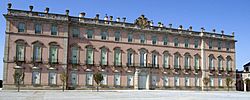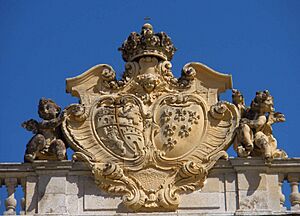Royal Palace of Riofrío facts for kids
Quick facts for kids Royal Palace of Riofrío |
|
|---|---|
| Native name Spanish: Palacio Real de Riofrío |
|
 |
|
| Location | Navas de Riofrío, Spain |
| Built | 1752-1759 |
| Built for | Elisabeth Farnese |
| Architect | Virgilio Rabaglio |
| Architectural style(s) | Italian baroque |
| Governing body | Patrimonio Nacional |
| Official name: Palacio Real de Riofrío | |
| Type | Non-movable |
| Criteria | Monument |
| Designated | 1931 |
| Reference no. | RI-51-0001065 |
The Royal Palace of Riofrío (Spanish: Palacio Real de Riofrío) is a beautiful palace in central Spain. It is one of the homes used by the Spanish royal family. The palace is managed by Patrimonio Nacional. This is a special government group that takes care of buildings owned by the Spanish state. The palace is located in a large forest where deer live. It is near the town of San Ildefonso in the province of Segovia.
The palace looks like an Italian building. It has a square shape and three floors. An Italian architect named Virgilio Rabaglio designed it. He made it look similar to the Royal Palace of Madrid. The palace is surrounded by a huge forest, about 625 hectares big. Many animals, like deer, live there. Kings and queens mostly used this palace for hunting. Only King Alfonso XII and his father, Francisco de Asís, lived there for a while.
Contents
History of the Royal Palace of Riofrío
Why Was the Palace Built?
The story of the Royal Palace of Riofrío began in 1746. Queen Elisabeth Farnese became a widow when her husband, King Philip V, passed away. Her step-son, Ferdinand VI, became the new king. To make sure Queen Elisabeth stayed away from the main court, King Ferdinand VI agreed to build a new palace just for her. This new home was to be at Riofrío. During her step-son's rule, Queen Elisabeth lived at the Royal Palace of La Granja de San Ildefonso.
The palace was built in a special spot near San Ildefonso in Segovia. It is about 11 miles from the main town. It is also close to the smaller towns of Navas de Riofrío and La Losa. The palace was designed in the Italian style. This was a nod to Queen Elisabeth's birthplace in Italy. The architect, Virgilio Rabaglio, was from Switzerland. He designed the palace with a central square and three stories. Many people say it looks like the Royal Palace of Madrid.
Who Lived at the Palace?
Queen Elisabeth Farnese had hoped her son, Charles VII of Naples, would become the next King of Spain. However, King Ferdinand VI died without children in August 1759. So, Charles VII became King Charles III of Spain. Queen Elisabeth became a temporary ruler until her son arrived in Spain. She then lived at the Royal Palace of Aranjuez. She passed away in 1766 and never actually lived at Riofrío. Queen Elisabeth was very successful in placing four of her children on thrones in different countries. She wanted to give the Riofrío palace to her youngest son, Infante Luis, Count of Chinchón, but he did not use it either.
The palace was left empty for some time. It was later finished as a hunting lodge. It was only used when the royal family went hunting in the nearby forests. Maria Josepha Amalia of Saxony stayed there to avoid problems at court. Francis, who was the king consort of Queen Isabella II, also used it. He stayed there to avoid his wife. Later, King Alfonso XII lived there. He was sad after his wife, Queen Maria de las Mercedes, passed away.
What Can You See Inside?
The Royal Palace of Riofrío has many interesting parts. You can see a special patio and a grand staircase. There is also a chapel. The palace has a collection of paintings, tapestries, and furniture. It is surrounded by a huge forest of 625 hectares. This forest is home to many animals, including deer. Today, the Royal Palace of Riofrío is also a museum. It tells the story of hunting through history.
See also
 In Spanish: Palacio Real de Riofrío para niños
In Spanish: Palacio Real de Riofrío para niños
- List of Baroque residences
 | May Edward Chinn |
 | Rebecca Cole |
 | Alexa Canady |
 | Dorothy Lavinia Brown |


